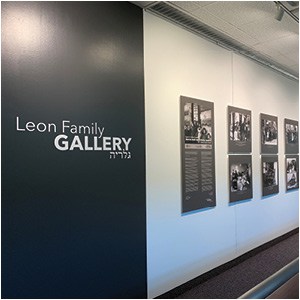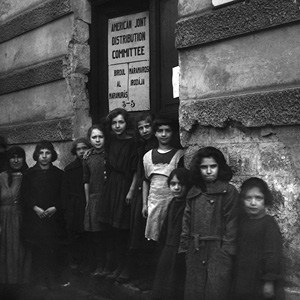 Leon Family Gallery
Leon Family Gallery
Reba and Sam Sandler Family Campus
Through October
The American Jewish Joint Distribution Committee was established on November 27, 1914 following the merger of two American Jewish relief committees, the Central Relief Committee for the Relief of Jews and the American Jewish Relief Committee. Later, a third constituent agency of the Joint Distribution Committee (JDC) joined the other two, the People’s Relief Committee. The Joint, as the organization is known, was established to raise funds from Jewish philanthropists in America and help fellow Jews living in Eastern Europe and Palestine, as a consequence of the outbreak of the World War I.
In Romania, the Joint became active in 1916. The JDC allocated funds for healthcare to help orphaned children because of World War I, illness, or pogroms. It was also involved in the establishment of childcare centers or vocational training centers.
In the 1920s and 1930s, the American Joint Reconstruction Foundation—established by the Joint Distribution Committee and the Jewish Colonization Association —whose network of credit cooperatives enjoyed great success in Romania played another important role.
 In the interwar period, Romanian Jews had gotten grants from the Joint for upgrading the “Ciocanul” (Hammer) vocational school, for the maintenance of the villa in Techirghiol, for erecting the “Morgenroit” school in Czernowitz, for supporting the activity of the Organization for Rehabilitation through Training (ORT), etc.
In the interwar period, Romanian Jews had gotten grants from the Joint for upgrading the “Ciocanul” (Hammer) vocational school, for the maintenance of the villa in Techirghiol, for erecting the “Morgenroit” school in Czernowitz, for supporting the activity of the Organization for Rehabilitation through Training (ORT), etc.
During the Holocaust, the JDC could not openly act in Romania, but they operated under the aegis of the International Red Cross.
After August 23, 1944, the Joint increased its aid budget, covering all aspects of Jewish life. Aid was granted to orphans and the sick, to those who had returned from Transnistria, from camps in Central Europe, for rebuilding destroyed communities, for health care and medical equipment or for vocational schools and student dormitories.
The Communist Party and the Joint were able to cohabitate, 1944–1948, but relations between the two organizations deteriorated. Given the changed political situation, the Cold War and the fall of the Iron Curtain separating the East and the West, communist authorities banned the Joint’s work in Romania, as well as the ORT and OSE (Oeuvre de Secours aux Enfants), by government decision on March 4, 1949. The end of the Joint’s and OSE’s activity considerably worsened the situation of the Jews in Romania, affecting more than 100,000 people who were receiving aid.
Given the thawing relations between Romania and Occident, JDC formally resumed its work in Romania in 1967. Using funds allocated by the Joint, the Federation of Jewish Communities of Romania provided food, clothes, and medical care to the Jewish population, as well as open kasher canteens and endow senior homes.
After the 1989 Revolution, new types of activity took place. Emphasis was put not only on social welfare, but also on the organization of cultural and educational activities for various age groups, from children to elders, and especially for Holocaust survivors.
By establishing Jewish Community Centers in 2007, favorable conditions for educational activities were created. In this regard, an important role is played by programs such as Bereshit and Keshet. These are held annually and specialists in Jewish history and Judaism, from Romania and Israel, hold lectures on Jewish history, culture, and civilization, thus contributing to the development of the self-consciousness of the Jewish population and of the Jewish identity. Particular attention is paid to the development of communal leadership in compliance with the Jewish spirit.
Learn more about JDC’s work in Romania by viewing the exhibit.
American Jewish Joint Distribution Committee (JDC) is the world’s leading Jewish humanitarian assistance organization, impacting millions of lives in more than 70 countries. JDC leverages a century of experience confronting poverty and crisis around the world to help the world’s neediest Jews, build Jewish life and leaders, empower all Israelis, and respond to global emergencies.
JDC receives significant funding support from Jewish Federations across North America, including the United Jewish Federation of Tidewater (UJFT), through cooperation with JFNA and UIA Canada and major funding partners including the Conference on Jewish Material Claims Against Germany, the Maurice and Vivienne Wohl Charitable Foundation, the Harry and Jeanette Weinberg Foundation, World Jewish Relief (UK) and tens of thousands of generous individual donors and foundations. The International Fellowship of Christians and Jews is a major operational partner.
United Jewish Federation of Tidewater works to meet the challenges facing today’s Jewish community at home and around the world through a network of local Jewish agencies and overseas service partners, including the JDC.
